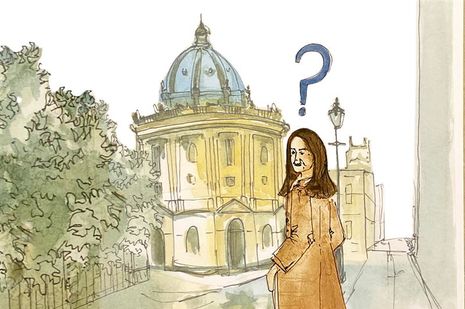My Oxford Year is a dubious Oxford dream
Hilary Lau asks whether My Oxford Year offers anything beyond clichés in its depiction of Oxford life

For international students at Oxbridge like myself, the endearing opening imagery of My Oxford Year tugs at the heartstrings: it is reminiscent of my own parents gesticulating at my older relatives, trying to share the magic of my life ahead only ever glimpsed on an electronic screen. Yet, emotional value aside, the rest of the movie felt like it had yet to make up its mind as to what role Oxford was to play in its plot.
Like many of its predecessors, My Oxford Year is a romantic drama that flaunts the Oxbridge aesthetic, using Oxford’s iconic views to establish the grounds for an equally dreamy romance. However, the movie’s exploration into the academic environment at Oxford is but skin-deep (though admittedly I did laugh at the sobering reality of dragging heavy luggage up very inaccessible stairs). Take Anna’s (Sofia Carson) first tutorial, where she realises that the professor she idolises for her academic work has been replaced by Jamie (Corey Mylchreest), a brash devil-may-care young man who previously drenched her in rainwater while driving by without so much as an apology. Jamie’s introductory speech to his tutorial class is a repackaged cliche, a weak call-back to more renowned carpe diem speeches a la the Dead Poet’s Society.
“The movie’s exploration into the academic environment at Oxford is but skin-deep”
Furthermore, rather than taking the opportunity to probe into what an actual lecture would feel like at Oxford, the filmmakers seem to treat its content like background noise, an unimportant diegetic murmur that fades away as we zoom in on the stilted banter between Anna and Jamie: they read some poetry, they cast daring smirks, they make hollow abstractions, they bicker some more, and that’s it. Anna’s tutorial is similarly hasty, in which she doesn’t seem at all enthusiastic about exploring her essay, but instead makes a throwaway feminist statement about how Browning’s poem is “subversive” and tosses in a shallow dig at men for good measure. Of course, it all has to lead up to Anna unknowingly reciting one of Jamie’s favourite poems, uniting them in their differences and seeing each other in a new light through hasty emotional connection. With this, the film propels the two leads into a standard romantic drama, the Oxford setting long forgotten, floating in the periphery of the audience, almost determined to not make itself known. To which I am prompted to ask: what then differentiates this film from more well-done counterparts, like Me Before You?
Another pervasive question itching at the back of my mind is Director Iain Morris’ decision to switch up Anna’s background. The novel by Julia Whelan, which the film is based on, establishes Ella (Anna) as a Rhodes Scholarship recipient, who has accepted a position as an education policy consultant for a presidential candidate in the US. These details are well-intentioned attempts to ground our main character – both literally in Oxford and metaphorically as someone already with prospects related to academia – yet the movie seems to miss the nuance by omitting this entirely, throwing Anna into a career at Goldman Sachs. Anna’s ability to secure a prestigious career in finance while also excelling at her literary pursuits transforms her into the do-all poster child of every parent's dreams, adding another layer of unreality to an already ungrounded plot. Wipe the slate clean and swap out the setting for Cambridge (the far superior option, I argue), University of Padua, or Yale, it doesn’t really make a difference. Oxford is but a cinematic postcard, portrayed as nothing that the audience doesn’t already know about the institution, nothing that comes close to the day-to-day of a real English student, and certainly nothing that gives the film its compelling edge.
“The film also risks endorsing the unabashed romance between a student and teacher”
Beyond simply reducing Oxford’s value to its aesthetic, the film also risks endorsing the unabashed romance between a student and teacher. The plot skirts around the edge of taboo, taking pains to justify that Jamie is an assistant lecturer and a DPhil student, but aside from the sparse lectures and minute-long tutorials he seems to give, he has no problem going around the university acting like a womanising frat boy. Sexual harassment and inappropriate student-faculty relationships are very real problems faced by students at any institution, and Oxford – mystifying as it may be – is not immune to this. Depicting a world where lecturers just saunter around with a harem of girls in their stead, flirting at pubs, and walking students home is playing a dangerous game, one where exploitative relationships are normalised and even romanticised within Oxford’s iron gates.
The message of My Oxford Year is a beautiful one – encounters can be fleeting but still hold insurmountable meaning, just as Anna’s short-lived romance with Jamie can inspire her to travel around Europe instead of rushing back to the US to fulfil career expectations. It’s especially empowering in a world that sits on the verge of nihilism, one that leaves us wondering where meaning resides in a fast-paced, transient world. Yet with its awkward dialogue and problematic storyline, My Oxford Year undermines the weight of its message with a lofty romantic ideal. As such, I wonder if this story is the right one to carry such a thematic burden, or if it’s biting off more than it can chew by pretending to offer more than a cliché.
 News / Cambridge academics sign open letter criticising research funding changes22 February 2026
News / Cambridge academics sign open letter criticising research funding changes22 February 2026 News / University Council rescinds University Centre membership20 February 2026
News / University Council rescinds University Centre membership20 February 2026 News / Supporters protest potential vet school closure22 February 2026
News / Supporters protest potential vet school closure22 February 2026 News / Hundreds of Cambridge academics demand vote on fate of vet course20 February 2026
News / Hundreds of Cambridge academics demand vote on fate of vet course20 February 2026 Comment / A tongue-in-cheek petition for gowned exams at Cambridge 21 February 2026
Comment / A tongue-in-cheek petition for gowned exams at Cambridge 21 February 2026








